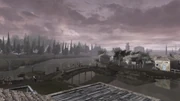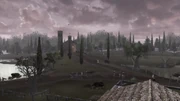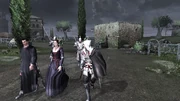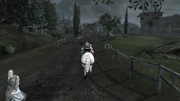(I got sidetracked into improving this article >.>) |
No edit summary |
||
| Line 2: | Line 2: | ||
{{WP-REAL|Romagna}} |
{{WP-REAL|Romagna}} |
||
{{Location Infobox |
{{Location Infobox |
||
| − | |image = |
+ | |image = Romagna - 2.png |
|factions = [[House of Borgia|Borgia]]<br />Orsi |
|factions = [[House of Borgia|Borgia]]<br />Orsi |
||
|targets = [[Ludovico Orsi]]<br />[[Checco Orsi]] |
|targets = [[Ludovico Orsi]]<br />[[Checco Orsi]] |
||
| Line 16: | Line 16: | ||
===Renaissance=== |
===Renaissance=== |
||
[[File:Tutti_a_Bordo_4.png|thumb|250px|left|Caterina Sforza stranded on an islet]] |
[[File:Tutti_a_Bordo_4.png|thumb|250px|left|Caterina Sforza stranded on an islet]] |
||
| − | In 1480, Ezio Auditore rode into the area, after being chased through the [[Apennine Mountains|Appennine Mountains]] by Borgia soldiers. He traveled through Romagna to access a ferry, up the coast of the Adriatic Sea to [[Venice]], alongside his close friend [[Leonardo da Vinci]]. Initially he was held up due to his lack of paperwork, though Caterina Sforza, Countess of Forlì, solved this problem when she took a shine to Ezio, following him rescuing her from an isolated rock on the |
+ | In 1480, Ezio Auditore rode into the area, after being chased through the [[Apennine Mountains|Appennine Mountains]] by Borgia soldiers. He traveled through Romagna to access a ferry, up the coast of the Adriatic Sea to [[Venice]], alongside his close friend [[Leonardo da Vinci]]. Initially he was held up due to his lack of paperwork, though Caterina Sforza, Countess of Forlì, solved this problem when she took a shine to Ezio, following him rescuing her from an isolated rock on the Forlì docks.<ref name="AC2">''[[Assassin's Creed II]]''</ref> |
In 1488, after recovering the [[Ezio's Apple of Eden|Apple of Eden]], Ezio and his uncle [[Mario Auditore]] decided to take the artifacr to Forlì, where they met with Caterina in the wetlands outside the city. However, upon reaching Forlì, word spread that the forces of [[Checco Orsi|Checco]] and [[Ludovico Orsi]] had invaded and gained control of the majority of the city.<ref name="AC2" /> |
In 1488, after recovering the [[Ezio's Apple of Eden|Apple of Eden]], Ezio and his uncle [[Mario Auditore]] decided to take the artifacr to Forlì, where they met with Caterina in the wetlands outside the city. However, upon reaching Forlì, word spread that the forces of [[Checco Orsi|Checco]] and [[Ludovico Orsi]] had invaded and gained control of the majority of the city.<ref name="AC2" /> |
||
| Line 50: | Line 50: | ||
Tutti a Bordo.jpg|Concept art of the shores |
Tutti a Bordo.jpg|Concept art of the shores |
||
Far From the Tree.jpg|Concept art of the countryside surrounding Forlì |
Far From the Tree.jpg|Concept art of the countryside surrounding Forlì |
||
| + | Romagna - 1.png|A settlement in Romagna |
||
| + | Romagna - 3.png|A small abbey in the Romagna wetlands |
||
Warm welcome 1.png|Caterina escorting Ezio and Machiavelli |
Warm welcome 1.png|Caterina escorting Ezio and Machiavelli |
||
Romagna Hustle 3.png|Ezio racing through the Romagna countryside on horseback |
Romagna Hustle 3.png|Ezio racing through the Romagna countryside on horseback |
||
| + | Scan0007-1.jpg|Map of Romagna |
||
</gallery> |
</gallery> |
||
Revision as of 20:14, 19 July 2014
Romagna is a region located in Italy, with Forlì being its main city. The area was ruled in the late 15th century by Caterina Sforza, an ally of the Italian Assassins.
Romagna was largely dominated by marshes, wetlands, and a number of scattered buildings. It also housed the Forlì docks, where ships from other areas stationed in its ports. Civilians could often be seen fishing from the wharves, or selling fish from market stalls nearby.
History
Origin
The name Romagna came from the Latin word Romània, which was originally the generic name for "land inhabited by Romans", first appearing on Latin documents in the 5th century. It later took on the more detailed meaning of "territory subjected to Eastern Roman rule", whose citizens called themselves Romans (Romàioi in Greek), considering themselves the heirs of Imperial Rome. Thus, the term Romània came to be used to refer to the territory administered by the Exarchate of Ravenna, in contrary to other parts of Northern Italy under Lombard rule, named Langobardia or Lombardy. Romània later became Romandìola in Vulgar Latin, which meant "little Romània", and then evolved into Romagna.
Renaissance
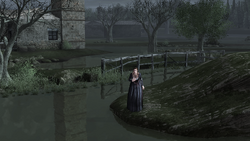
Caterina Sforza stranded on an islet
In 1480, Ezio Auditore rode into the area, after being chased through the Appennine Mountains by Borgia soldiers. He traveled through Romagna to access a ferry, up the coast of the Adriatic Sea to Venice, alongside his close friend Leonardo da Vinci. Initially he was held up due to his lack of paperwork, though Caterina Sforza, Countess of Forlì, solved this problem when she took a shine to Ezio, following him rescuing her from an isolated rock on the Forlì docks.[1]
In 1488, after recovering the Apple of Eden, Ezio and his uncle Mario Auditore decided to take the artifacr to Forlì, where they met with Caterina in the wetlands outside the city. However, upon reaching Forlì, word spread that the forces of Checco and Ludovico Orsi had invaded and gained control of the majority of the city.[1]
After discovering that the gates to the city were locked, Caterina instructed Ezio to infiltrate it via a secret entance, which involved Ezio swimming under Forlì's moat and entering from there. While Caterina distracted the invaders with a volley of insults, Ezio dispatched any soldiers in his way and opened the gates to the city, allowing Caterina and her soldiers inside, where they swiftly retook it.
On entering Forlì, Ezio, Caterina and Niccolò Machiavelli made their way to the Rocca di Ravaldino to fight off the attacking invaders, defeating them and reaching the inner citadel. However, upon reaching it, Caterina discovered that her children, Bianca and Ottaviano Riario, were missing and that the Orsi brothers and their army of Borgia soldiers had begun breaching the citadel, forcing Ezio and the Assassins to defend. Despite this, they were able to successfully fend off most of the attackers and hold the city, though they were soon confronted by the Orsi brothers themselves.[1]
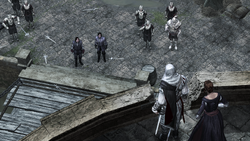
The Orsi brothers taunting Caterina
The two called out to Caterina, informing her that they had kidnapped her two children, explaining that they would only be returned once Caterina had handed over her husband's map detailing the locations of the Codex pages. In response, Caterina vehemently hurled insults at them, refusing to hand over the map. The Orsi brothers stated in return that she had one hour to hand over the map before they killed her children. On their departure, Caterina turned to Ezio for help, asking him to rescue her children for her. To this, Ezio agreed, and handed over the Apple to her to protect.[1]
Ezio departed and headed for the Romagna countryside, where he defeated the guards imprisoning Bianca, who then directed him to the location of her brother, Ottaviano. From there, he headed through the marshes to a nearby lighthouse, where he scaled the building, killed Ludovico and rescued Ottaviano. However, upon dispatching Ludovico, Ezio learnt that the captured siblings had been a distraction, allowing for the theft of the Apple. With this, the Assassin hurried back to the city, discovering that Checco had acquired the Apple.
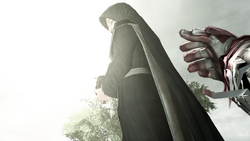
Savonarola taking the Apple
Ezio tracked him down and killed the last Orsi brother and retrieved the Apple, though not before Checco managed to stab Ezio in the abdomen, causing him to lose consciousness and drop the artifact. As Ezio slipped into unconsciousness, he saw a black-robed monk with a missing finger pick up the Apple and walk away.[1]
Afterwards, Ezio awoke inside the city, where he was being tended to by Caterina, after Forlì guards discovered him in the countryside whilst scouting the area. Upon regaining consciousness, Ezio explained to Caterina what had happened, and she pointed him in the direction of a nearby abbey in the wetlands outside the city as a good spot to look for clues, regarding the location of the mysterious black-robed monk. Additionally, Caterina gave Ezio the Codex map, to which he thanked her and left, with the abbey as his objective.[1]
Ezio traveled through the Romagna marshlands until he reached the abbey, where he saved an Irish priest, Brother O'Callahan, from Borgia thugs. Ezio questioned him about the monk with a missing finger, and O'Callahan directed him to an abbey inside the city of Forlì.[1]
The Assassin returned to the city and headed for the abbey, however, once he arrived there, one of the priests recognized him as the murderer of Stefano da Bagnone, the Templar that Ezio had assassinated nine years earlier. Fearful, the priest attempted to run away, though Ezio caught up to him and tackled him. He quickly explained that Stefano's death was necessary, and managed to convince the priest of this, before he inquired about the identity of the black-robed monk with the missing finger, which the priest confirmed to be Girolamo Savonarola. From there, Ezio asked where he might have gone, and the monk said that he may have returned to Florence, to which the Assassin quickly departed for.[1]
Trivia
- Before the release of Assassin's Creed II, developer Ubisoft Montreal referred to the area as the "Wetlands."
- Romagna was the poorest region in Assassin's Creed II, and its surrounding area was flooded with dirty water, ravaged buildings and overgrown with weeds. Very few civilians wore affluent clothing (such as feather hats and scarfs), nor did they possess a respectable amount of money to pickpocket.
- The Wetland Ebony and Wetland Ivory dyes for Ezio's robes were obtainable in Romagna from any tailor, and granted the "Perfect Harmony" achievement when worn together.
- Romagna was the location of the first Assassin's Creed II DLC, the Battle of Forlì.
- By downloading the Battle of Forlì DLC, the Flying Machine was available to access at any time, on top of a lighthouse, where a feather was also located.
Gallery
References




